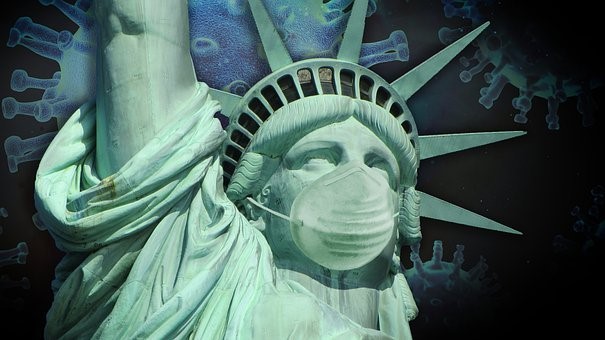This article was provided exclusively to the New York Analysis of Policy & Government by the distinguished retired judge, John H. Wilson.
Across the country, a series of local and state governments have mandated that people wear facial masks while in public, regardless of whether they are on public or private property. For instance, in California, “Gov. Gavin Newsom…ordered all Californians to wear face coverings in public places and at work, as well as outdoors when it’s impossible to stay six feet apart from others,” while in Kansas, “Governor Laura Kelly reiterated the importance of wearing protective face masks to prevent the spread of COVID-19, insisting that her order requiring masks to be worn in public places is not about personal freedom but a matter of public health.”
At last count, approximately 18 states have mandated wearing facial coverings in public spaces, including California, New York, Hawaii, New Jersey, Connecticut, Pennsylvania and Virginia. Many local governments have mandated masks regardless of whatever rules their state government has promulgated. The Mayor of Boise, Idaho has ordered the use of face masks in public, as did the Mayor of Minneapolis (who as we’ve seen, ended up having more serious problems than whether or not people in his city were “socially distancing”)
Yet, despite these Executive Orders from local and state governments, the question remains – are these orders legal?
The legal challenges to face mask mandates have only begun. But the history of other restrictions imposed on the public in the name of fighting Covid-19 can be instructive.
In May, the Wisconsin Supreme Court overturned the extension of Governor Tony Evers’ “stay at home” order by that state’s Department of Health, calling it both “unlawful” and “unenforceable.” In particular, the Court noted that “an agency cannot confer on itself the power to dictate the lives of law-abiding individuals as comprehensively as the order does without reaching beyond the executive branch’s authority.”
In Oregon, a lower court judge “ruled that (Democratic Governor Kate) Brown erred by not seeking the Legislature’s approval to extend the stay-at-home orders beyond a 28-day limit,” however the Oregon Supreme Court issued a stay of that decision “pending review by all the high court justices.” In particular, the lower court “wrote that the damage to Oregonians and their livelihood was greater than the dangers presented by the coronavirus. He also noted that other businesses deemed essential, such as grocery stores, had been allowed to remain open even with large numbers of people present and have relied on masks, social distancing and other measures to protect the public.”
The Wisconsin Supreme Court and Oregon lower court rulings are consistent with the decision of Kentucky Federal Judge Justin Walker, (discussed in my May 12 article, “Spreading Hatred of the Faithful,” which reversed an order by the Mayor of Louisville preventing parishioners from attending a “drive in” church service.
In another victory for religious freedom, Federal Judge James C. Dever III ruled that the Executive Order of Democratic North Carolina Governor Roy Cooper violated the First Amendment freedoms of several Baptist churches, in that “the Governor appears to trust citizens to perform non-religious activities indoors (such as shopping or working or selling merchandise) but does not trust them to do the same when they worship together indoors.”
Thus, Courts have been willing to reverse orders that do not treat all equally (such as allowing liquor sales but not church services), or that exceed the authority of the governing body.
A case study in a local municipality which has used Covid-19 to repeatedly exceed their authority is presented in South Florida.
Recently, a lawsuit has been filed challenging the Commissioners of Palm Beach County, Florida, who issued their own Executive Order requiring face masks in public on June 24, 2020. EO 20-012 states that “Facial coverings must be worn by all persons…while obtaining any good or service or otherwise visiting or working in any business or establishment, including entering, exiting, and otherwise moving around within the establishment.” This includes “restaurants, retail establishments, hotels, grocery stores, gyms, pharmacies, indoor recreational facilities, and vehicles for hire.”
This exceeds the Executive Order issued by Governor DeSantis, which states that “Restaurants and other establishments, and bars…may operate at fifty (50) percent of their indoor capacity…Bar areas may be open with seated service. In addition, outdoor seating is permissible with appropriate social distancing.” There is no requirement for patrons of restaurants to wear a mask under the Governor’s order.
The Palm Beach Commission’s Executive Order also requires the posting of signs by “restaurants and food service establishments” that emphasize the absurdity of the order. The required sign states that “all patrons must wear facial coverings except while actively consuming food and beverage. This means you must wear a facial covering when entering, exiting, or otherwise away from your assigned table, including when visiting the restroom.”
To prove they are serious, the Palm Beach County Executive Order also states that “a failure to establish and ensure such compliance may result in fines, penalties, and/or any other enforcement measures against the business as set forth in this order and as otherwise authorized by law.”
In other words, if you own a restaurant in Palm Beach County, not only must you post a sign, but you must ensure that your patrons wear a mask while waiting for their food, and anytime people are not actively eating, you must have your staff enforcing this rule. As a patron, if you order a drink, you are expected to wear a mask, take it off to take a sip, put your mask back on, and leave it on until you take another sip. All while presumably sitting at a table with people you know, probably live with, and probably interact with on a regular basis without wearing a mask.
All under the threat of a financial penalty.
According to a statement made by the Florida Civil Rights Coalition, who filed the lawsuit against the Palm Beach Commissioners, “The unlawful mandate clearly violates our constitutional and fundamental human right to privacy and bodily autonomy, and despite having no authority under Florida law to do so, Palm Beach County officials recklessly violated the rights of countless American citizens and Florida residents.”
This is not the first time the Palm Beach Commissioners have exceeded their authority. EO 2020-003a dated March 29, 2020, closed all public and private golf courses in Palm Beach County. In April, I notified the Palm Beach County Commissioners that their order was inconsistent with Florida Governor Ron DeSantis’ Executive Order of April 1, 2020, which declared golf to be an “essential” recreational activity, making the Commission’s March 29 order illegal.
Several of the Palm Beach Commissioners were gracious enough to answer my email, with one defending their Executive Order, claiming that due to an inconsistency between Governor DeSantis’ Executive Orders, there was essentially one set of rules for South Florida, and another for North Florida.
I informed the Commissioner that their interpretation was incorrect, since Governor DeSantis had stated clearly that his Order of April 1st “shall supersede any conflicting official action or order issued by local officials in response to COVID-19.” I never heard back from the Commissioners, but by the end of April, the Commission had allowed the golf courses of Palm Beach to reopen.
There are other states where citizens have united to fight overly aggressive mask regulations. In Washington State, Gov Jay Inslee’s Executive Order has been challenged by, among others, the Commissioner of Franklin County, Clint Didier. Back in Florida, a business owner has challenged Orange County’s mask mandate.
These lawsuits are the most effective way for private citizens and business owners to fight back against the excesses of local and state governments. Without challenges such as these, Governors and local authorities can continue to infringe on your individual rights, all in the name of fighting a “pandemic” with a current death rate of less than 5% of those infected.
Illustration: Pixabay









